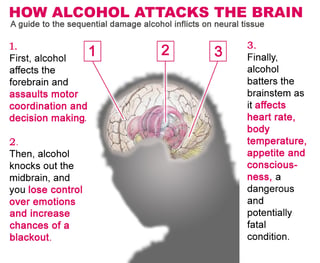Alcohol is a psychoactive drug that acts as a central nervous system depressant.
Drinking under-age increases alcohol risks in later life. Research shows the brain keeps developing well into the twenties, during which time it continues to establish important communication connections and further refines its function and studies show that young people who drink heavily may put themselves at risk for a range of potential health problems.
Extreme alcohol consumption can cause memory loss, loss of coordination and alcohol poisoning, in some cases can be fatal.
Health risks associated with drinking include:
brain effects,
Alcohol interferes with communication between nerve cells and all other cells limiting the ability to think clearly.
First alcohol affects the forebrain responsible for motor coordination and decision making. Secondly it knocks out the midbrain, so you lose control over emotions and you've more chances of black outs.

Image credits: The Immortal Alcoholic
Research has shown that animals fed alcohol during this critical developmental stage continue to show long-lasting impairment from alcohol as they age2002. Subtle changes in the brain may be difficult to detect but still have a significant impact on long-term thinking and memory skills.NIH
liver effects,
Every time you drink, your liver has to filter it out of your blood and a lot of alcohol over a short period of time (BAC) won't give enough time for the body to process it all.
In addition persons below the age of 25 and women may process alcohol more slowlywiki.
Elevated liver enzymes, indicating some degree of liver damage, have been found in some adolescents who drink alcohol2001.
Young drinkers who are overweight or obese showed elevated liver enzymes even with only moderate levels of drinking2000.
growth and endocrine effects,
Consuming alcohol largely affects the body's endocrine system resulting in changes of various hormone levels which can disrupt a normal growth.
Drinking alcohol during puberty period of rapid growth and development may upset the critical hormonal balance necessary for normal development of organs, muscles, and bones. Studies in animals also show that consuming alcohol during puberty adversely affects the maturation of the reproductive system2001.
See: Alcohol and cortisol at Wikipedia
Source: Underage Drinking at NIAAA
